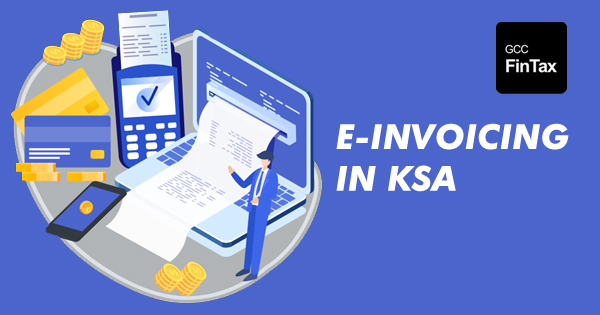
On May 28, 2021, Saudi Arabia's General Authority of Zakat and Tax (GAZT) Arabia announced its finalized e-invoicing legislation, which has subsequently combined with the Customs Authority to establish the Zakat, Tax and Customs Authority (ZATCA). This makes e-invoices mandatory for B2B, B2G, and B2C transactions, with two phases of implementation[1]:
Anyone residing in Saudi Arabia for VAT reasons must create electronic invoices for domestic transactions, according to the law. This does not apply to cross-border bills or individuals who are not VAT residents.The actual structure, content, security measures, and CTC system requirements vary each phase and for the two invoice kind1.
For efficiency and security, the Saudi government is using e-invoicing.E-invoicing can improve transaction efficiency by making commerce more fluid and efficient, resulting in faster payments and lower costs, while also giving the government a better understanding of market circumstances.In keeping with worldwide best practices, this also promotes fair competition, strengthens corporate competitiveness, and enhances consumer protection in the market.E-invoicing enables a government, depending on the template to be applied, to detect, minimize the shadow economy and monitor commodities, services and money movement in real time. As a result, tax compliance rates would rise, commercial transactions would be more transparent, and data-driven decision-making would be possible[2].
In Saudi Arabia, taxable persons shall issue and maintain electronic invoices with the data fields prescribed.Third parties issuing tax invoices on behalf of resident taxable people are likewise subject to the regulations. Taxable persons who are not Saudi Arabian residents will be exempt from the e-invoicing rules.For all transactions that require tax invoices, e-invoices must be issued. Taxpayers are also required to offer credit and debit notes in an electronic manner.Preliminary requirements for the technology that facilitates the issuing and storage of e-invoices are included in the e-invoicing regulations, including[3]:
By December 4, 2021, taxpayers must be able to send, receive, and keep electronic invoices.Within the following six months, Saudi authorities will reveal more information on the e-invoicing framework, including system and technological criteria for enterprises wishing to use it3.
Controls, requirements, technical specifications, or procedural norms are identified in the e-invoicing resolution for the implementation of the e-invoicing regulations provisions, which are connected to the following[4]:
E-invoicing phase 1: Taxpayers will be required to issue electronic invoices using a compliant system that provides for the representation of the required fields in the electronic invoice. In addition, the system must archive and send an electronic copy to the client. Invoices submitted by hand will no longer be accepted.The VAT number of the buyer, if registered as a taxpayer mandated to invoice; the issuance date of the invoice; and the VAT are the mandatory fields that has to be incorporated in an electronic invoice during 1st phase. Issuers can include a QR code to B2B bills at their discretion, but it must be included on simplified B2C invoices[5].
E-invoicing phase 2: The "integration phase" is what it's called. All invoicing systems must be compatible with the ZATCA system after this date. The integration with the ZATCA system will be phased in over time, depending on the taxpayer class. Taxpayers will be notified by ZATCA at least six months prior to their required integration date.The following requirements must be met at this phase: All electronic invoices, including tax invoices and simplified tax invoices, as well as their supporting documentation, must be created in the XML or PDF/A-3 (with XML) formats.To ensure the integrity of the invoices, the following security methods must be implemented: digital signature, unique universal identification (UUID), hash generation, and QR code.Starting the transfer to the new electronic invoicing system is highly advised. Phase 1 allows taxpayers to learn more about the system and provide the groundwork for a solution that works with the ZATCA system.EDICOM's International Electronic Invoicing Platform for the issuing and receipt of electronic invoices is adjustable to the requirements of each country in which you and your partners do business and is regularly updated to assure compliance5.
Disclaimer: Content posted is for informational & knowledge sharing purposes only, and is not intended to be a substitute for professional advice related to tax, finance or accounting. The view/interpretation of the publisher is based on the available Law, guidelines and information. Each reader should take due professional care before you act after reading the contents of that article/post. No warranty whatsoever is made that any of the articles are accurate and is not intended to provide, and should not be relied on for tax or accounting advice.
You can access Law including Guidelines, Cabinet & FTA Decisions, Public Clarifications, Forms, Business Bulletins for all taxes (Vat, Excise, Customs, Corporate Tax, Transfer Pricing) for all GCC Countries in the Law Section of GCC FinTax